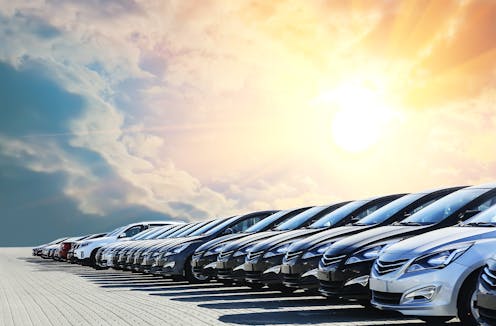Fears over future of the car industry as sales fall and spare parts become scarce
- Written by David Bamford, Professor of Operations Management, Manchester Metropolitan University

Much money and time has been spent recently persuading people not to be so reliant on cars[1]. And there are certainly good reasons – for our health and the environment – to move about more on foot, by bike or on trains.
Yet cars are still an essential form of transport[2] across the world. In many countries, including the UK, outside of the few metropolitan areas with decent public transport, people depend on them[3].
But car owners face an increasingly difficult choice. For many, electric vehicles are still too expensive[4] and considered too risky[5] in terms of driving range[6], battery costs and charging infrastructure.
Private customers are not buying as many of them[7] as was expected, and are choosing to keep hold[8] of their old petrol and diesel cars instead.
Yet at the same time, car manufacturers are shifting their production[9] to electric vehicles, and have reduced[10] making replacement parts for the petrol and diesel vehicles.
Simply put, there are not enough spare parts to keep all the older vehicles running. And the longer people keep their cars, the more spare parts are going to be needed.
Waiting times and costs for MOTs and servicing have already started to increase[11], and will continue to do so. And a low supply of spare parts means the prices for those parts will also increase.
As a result, some older cars will become unusable, sitting in garages for weeks or even months, awaiting replacement parts. But the original manufacturer may not have any, and will not be making any more[12].
The consequence of having a vehicle off the road will mean increased hardship for families in terms of commutes, school runs, grocery shopping and any other day-to-day transportation needs.
This situation means that certain petrol and diesel secondhand cars, which have good availability of parts, will become more valuable. For example, those manufactured by VW, Audi, Seat and Skoda are all built on the same basic engineering platform, so parts are plentiful. But for the owners of other makes, such as Jaguar Land Rover and Kia[13], getting hold of spare parts will be more problematic.
This will have a knock-on effect for some manufacturers. A lack of spare parts stock will probably damage their reputation along the supply chain, from mechanics and garages to car dealerships and potential customers.
Then there is the complication of the UK’s zero emissions vehicle mandate[15], which requires 22% of all new car sales to be electric vehicles. Car manufacturers who fail to hit this target – which also exists in other countries[16] – face fines[17] of around £15,000 for every vehicle they miss their target by.
As a result, some of them will probably end up choosing to stop taking orders for petrol, diesel and hybrid cars, forcing customers to wait or go elsewhere. This will put additional pressure on demand for used cars, and the spare parts those used cars need.
The situation would be much improved if people were happy to buy electric vehicles. But for the moment[18], it seems they are just too expensive, have limited distance range, and can be inconvenient to charge – especially if you do not have a driveway (and 40% of UK households do not[19]).
Even the mega factories of China – producing cars that sell for approximately 17% of western prices[20] – cannot help, as they are subject to huge tariffs[21].
Instead, the motoring public are understandably confused and cautious – and hanging on to the cars they already own.
This is obviously bad news for the environment. There are currently 45 million electric vehicles[22] in the world, a number which the International Energy Agency says[23] will need to rise to 790 million if net zero is to be achieved by 2050. That equates to a growth in sales of 27% every year, which is just not happening.
Something needs to give – and in the UK, where the automotive sector contributes £20.2 billion a year[24] to the Treasury and employs 168,000 people, things need to move faster if the critical factors of the supply chain[25] are to be resolved.
A situation where most households find it unaffordable to drive electric cars, but can’t find the parts necessary to keep their old cars running, is not tenable.
From a purely pragmatic perspective, politicians may ultimately be forced to change their zero emissions mandates and targets to keep people – and economies – moving. This would be a huge backward step for the planet. But for motorists trying to do the right thing, the road ahead looks increasingly uncertain.
References
- ^ so reliant on cars (theconversation.com)
- ^ essential form of transport (etrr.springeropen.com)
- ^ depend on them (modeshift.org.uk)
- ^ too expensive (cardealermagazine.co.uk)
- ^ considered too risky (global.lockton.com)
- ^ driving range (www.researchgate.net)
- ^ buying as many of them (www.bbc.co.uk)
- ^ keep hold (choosemycar.com)
- ^ shifting their production (www.tsg-solutions.com)
- ^ have reduced (www.tsg-solutions.com)
- ^ started to increase (www.fleetnews.co.uk)
- ^ not be making any more (www.bodyshopbusiness.com)
- ^ Jaguar Land Rover and Kia (www.autocar.co.uk)
- ^ Dezay/Shutterstock (www.shutterstock.com)
- ^ zero emissions vehicle mandate (www.gov.uk)
- ^ exists in other countries (www.joosup.com)
- ^ face fines (cardealermagazine.co.uk)
- ^ for the moment (www.bbc.co.uk)
- ^ 40% of UK households do not (www.thisismoney.co.uk)
- ^ 17% of western prices (www.reuters.com)
- ^ huge tariffs (www.bbc.co.uk)
- ^ 45 million electric vehicles (www.iea.org)
- ^ says (www.iea.org)
- ^ £20.2 billion a year (www.smmt.co.uk)
- ^ critical factors of the supply chain (www.tandfonline.com)







